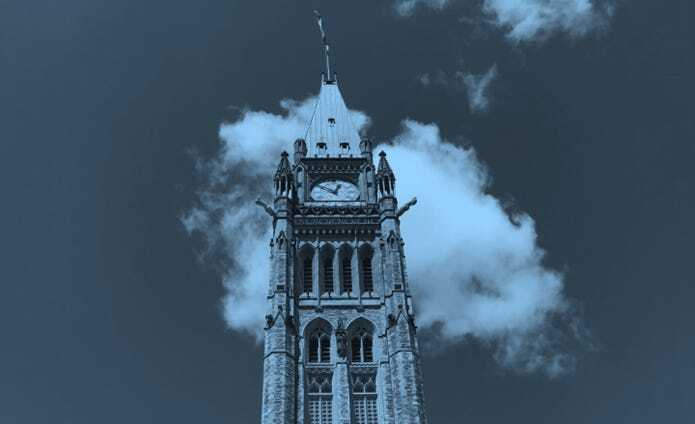We’re going to get 8 years of Conservatives blaming the liberals for why they too can’t make life more affordable. While also rolling back social protections.
It’s how Canadians roll: we decide we like a party leader, we elect them, and after eight or ten years we decide it’s time for a change. It doesn’t matter who the other leader is, we just decide to switch.
The problem is that it’s a guaranteed pendulum between the Liberals and Conservatives. Without a third party, the out-of-power party just needs to wait. They don’t need compelling policy, they don’t need a decent leader, they just need to show up.
Agh. Truly. Is there any way to reform the electoral system without relying on an elected party to make it happen?
There are ways but the most common methods of political reform in history are rather violent, unfortunately.
I do think we need youth more involved in politics and a less apathetic population. I think vote reform should come from the local/municipal level and move up from there once a good chunk of cities have it, but unfortunately in Ontario the Progressive Conservatives stopped making it legal for municipalities to change their system.
It’s how Canadians roll: we decide we like a party leader, we elect them, and after eight or ten years we decide it’s time for a change. It doesn’t matter who the other leader is, we just decide to switch.
I mean we elected a party that promised Electoral Reform and that this would be the last FPTP election. That should’ve been enough. They just changed their minds after they won.
This is not accurate, the majority on the electoral reform committee on the house was the NDP, Greens, CPC and BLoc. They passed from committee reccomendations that ensured electoral reform wouldn’t pass the house. They should wear this as much as anyone.
The ER committee laid out options for the Government and made the following recommendation:
Recommendation 1
The Committee recommends that the Government should, as it develops a new electoral system, use the Gallagher index in order to minimize the level of distortion between the popular will of the electorate and the resultant seat allocations in Parliament. > The Government should seek to design a system that achieves a Gallagher score of 5 or less.
Recommendation 2
The Committee recommends that, although systems of pure party lists can achieve a Gallagher score of 5 or less, they should not be considered by the Government as such systems sever the connection between voters and their MP.
That means that STV (which is multi-member ranked-ballot with large ridings), MMP (local ridings with a regional proportional fallback), and the urban-rural hybrid (cities get STV, rural areas get MMP) were all on the table as options. The Liberals just flipped the chessboard because the committee didn’t recommend their preferred ranked-ballot-instant-runoff-single-member system.
Open-list MMP with ~12-member regions would be an excellent solution for Canada.
I’d oppose any system that doesn’t tie members to single seat ridings. “Councillors at large” are the bane of any system they’re in: they float in the background beholden to none of the voters, almost impossible to remove, and loyal only to the party. More than one member per district and you end up with two or more people playing hot potato and pointing at each other claiming the other was supposed to handle it, whatever the “it” happens to be.
The Gallagher Index is not the be-all, end-all of fairness. The last Canadian election had an index of 12, the last US election had an index of 5. I don’t think very many would say the US system is better.
The CPC were going to oppose any change, and got their way on having a referendum which was absolutely going to fail, especially with the CPC framing it as a Liberal power grab, regardless of the eventual method chosen.
Internal polling, not the dog and pony online poll, showed that while 50ish% of voters might support a change, support fractured once the different options entered the mix. A high number of voters were absolutely tied to their preferred method and would oppose the others.
The Liberals read the writing on the wall, cut their losses and abandoned the project. If nothing else, it’s killed any chance of electoral reform for the foreseeable future.
“Councillors at large” are the bane of any system they’re in: they float in the background beholden to none of the voters,
This is FUD. An open-list MMP system has nobody whose name was not on a ballot - the idea is that the backfill-seats go to the most popular people (by ballots) within the backfilling party. So if there’s some loathed backbencher within a party, they can’t squeeze in by the list because voters who like that party can still vote for somebody else.
And STV is even more direct in that every person on the ballot is ranked individually by voters, it’s just STV includes multiple members of the same party on the same ballot because there’s more than 1 seat up for grabs in the riding.
We have parachute MP candidates today. We have PCPO candidates who don’t even show up for debates. Jack Layton managed to get Brosseau a seat in Quebec, when was a college student who spent the election in Vegas and didn’t speak French. I doubt half of Canadian voters could even name their current MP.
Celebrating an absurdly disproportionate system in order to preserve something that is already a sham and with attacks that aren’t even relevant to the systems on the table is ridiculous. nobody is proposing a closed-list system.
Many countries have switched from FPTP systems to proportional systems. Many more have campaigns to do so. How many countries have the reverse? How many campaigns are out there to go back to FPTP? None, because it’s a dumb system.
We have absolutely no idea if the system will be STV, MMP, the bastardised STV-Urban/MMP-Rural system, open or closed party lists or something else entirely, because everyone and their dog has their preferred system. With the pols making the final decisions, it’s safe to assume that the parties will do what they must to benefit the respective parties. Also Germany, Portugal, Spain, Italy, NZ, etc use closed lists, so it’s hardly unheard of.
Fortunately, it’s not something we’ll have to deal with for a very long time. The Liberals are feeling hard done by for the backlash they got, the CPC were absolutely not on board from the beginning and were going to fight it tooth and nail, the beleaguered NDP are as close to power as they’ll likely ever be, but nowhere close enough to force the issue. The Bloc will continue to be agents of chaos and do what they can to be disruptive.
Random polling of the electorate over the years has satisfaction with the current system bouncing between 50 and 70%, mostly dependent on the state of the economy. When asked whether is should be changed from FPTP, you can get up to 60% support, but as soon as you put forward specific systems, support fragments, and FPTP becomes the default. That’s been born out by the numerous aborted attempts for change at the provincial level.
As far as what other countries are doing, uh, so what? Are they better run? Most of Eastern Europe is dominated by fascist or fascist adjacent governments. Much of Western Europe is leaning in that direction. Much of Germany is still beholden to the friggen coal industry of all things. And Italy, basically in constant political turmoil, has outdone themselves by putting the actual fascists back in power.
Yes, of course. Canada and its provinces stand as a democracy. The population at large are in charge. They can do whatever they want. The only thing that can get in their way is themselves.
And that population has tested the electoral reform waters numerous times, especially provincially where referendums have been hosted on multiple occasions to gauge opinion, but interest in change has struggled to present itself.
deleted by creator
we decide we like a party leader, we elect them
Maybe, if they are in your riding. The average riding has ~100,000 people, and there are only so many parties, so only a small percentage of the population ever have the opportunity to elect a party leader.
It’s a summertime poll in a non-election year. It’s about as useless as tits on a fish.
Outside of election season in general. No poll has any real value as they swing wildly back and forth depending on what’s going on.
Most voters have such short term memory that they forget what’s been said and done outside of election season unless if it gets memed on.
I fully expect nearby foreign events to be a competitive issue to housing in 2025. I could be wrong, but it seems likely, especially if we see positive movement on the housing issue.
don’t let the dnd people hear you say that, they still haven’t gotten over lizardfolk boobs
Might make fishing more interesting, however…
ROFL, “tits on a fish.” Will plagiarize it for next time.
Don’t kink shame. >:(
High cost of living, unsustainable gas prices, runaway climate change, housing crisis, stagnant wages.
I’m sure the right wingers will be the perfect solution to these problems.
its just how pendulum politics works. keep alternating back and forth , rarely do we ever get real solutions.
We’re fucked. Even more, I mean.
Well yeah, Trudeau stuck his foot in his mouth about housing, and continues to not solve the massive problem. I get the anger, and since “progressive” Neoliberals can’t solve it, they’re turning to Pierre.
Yes, let’s follow Pierre’s solution.
Wait. What is it again? Aside from “suck it hair guy” they don’t have a platform.
I love how this decades-old problem is being hung around Trudeau’s neck and the only apparent solution is a nothingburger from a team usually gleefully fucking over the plebes.
That’s good politics works. The guy in charge openly washed his hands of the problem and doesn’t seem to have any solutions. So the masses are turning to the person who says “I can fix it!”, even if he doesn’t have a plan.
I can’t stand PP (he panders too much to extremists like antivaxxers and anti-trans chuds like Dr Peterson and was anti-spending during pandemic shut-downs) but his approach to housing is probably the best one on the table: he wants to specifically target municipal red tape and punish cities by cutting federal funding to large cities that don’t upzone and hit their housing targets. These are specific policy planks with hard numbers in them. There are parts I disagree with (like restricting it to municipalities over 0.5M residents) but it’s the right direction.
I’m firmly in the YIMBY camp, and PP is the only person talking anything approaching sense on that particular issue. Ford had the Housing Affordability Task Force tell him the same thing, and he threw away 99% of their recommendations and instead focused on handing the Greenbelt out to his croneys.
Trudeau has the Housing Accelerator Fund for similar purpose, but that’s carrots instead of sticks. Municipalities have spent decades fighting tooth and nail against infill housing, they deserve sticks and not carrots. It was municipal governments that put us behind this 8-ball, and then the post-pandemic era sunk it.
edit: downvote away, but the fact is he does have a specific plan. Unfortunately NatPo is the only media source I could find writing about it - better-media sources with info and analysis of his plan welcome.
Are you in Ontario? Because Conservatives “cutting red tape” on municipal planning means greenlighting sprawling mcmansion developments on remote farmland, and resort style condo towers in town. Neither of which are intended, or help the housing affordability issue. It’s actually the reverse; we have municipalities trying to get developers to infill, and getting overwritten by ministerial zoning orders.
Yes, I’m in Ontario. Ford had put together a Housing Affordability Task Force that said the exact things I’m saying - dozens of recommendations on eliminating red-tape that was blocking infill. Ford ignored all those recommendations (why did he even assemble the HATF if he wasn’t going to use their ideas?) and then opened the greenbelt.
See the HATF document:
https://files.ontario.ca/mmah-housing-affordability-task-force-report-en-2022-02-07-v2.pdf (warning, PDF)
Some notable quotes:
Recommendations 3 through 11 address how Ontario can quickly create more housing supply by allowing more housing in more locations “as of right” (without the need for municipal approval) and make better use of transportation investments.
Recommendation 12 would set uniform provincial standards for urban design, including building shadows and setbacks, do away with rules that prioritize preservation of neighbourhood physical character over new housing, no longer require municipal approval of design matters like a building’s colour, texture, type of material or window details, and remove or reduce parking requirements.
See? This is all good urbanism. Good YIMBYism. It’s very sad that Ford ignored 99% of the document. And meanwhile, municipalities screamed bloody murder about the HATF recommendations.
we have municipalities trying to get developers to infill
Sauce? Because every person in the industry that I follow says the opposite.
For example, this PDF was missisauga’s response to HATF:
Staff have concerns, however, that some of the Task Force’s recommendations may remove some decision making powers from Council, reduce community engagement, lower design standards and could undermine the creation of complete communities. Moreover, certain changes could reduce revenues generated by development related charges which could be a risk to infrastructure and parkland provision.
Mississauga has been one of the worst cities for missing building targets - they had no plan beyond “build tower-in-park highrises downtown, sprawl to our limits and then do nothing everywhere else.” And now their Mayor wants to run the Ontario Liberal party, which is so egregious it actually got me to register to vote in their leadership race to support her opponent.
For another example, see this video of deposition by Mark Richardson of Housing Now TO (an affordable housing builder):
https://mastodon.social/@Pxtl/110300343308877005 (yes, this is my mastodon toot, but it’s his video).
This is a guy trying to build he’s trying to build subsidized, low-cost housing everybody says they wants. Trying to build Green Buildings everybody says they want. And the municipal government is blocking him at every turn, with “guidelines which are treated like they’re cast in stone”.
$20 billion dollar intersection in Forest Hill; somebody said that should be a 7-storey and 70-unit building in 2018. How…where did that number come from? Somebody picked that number. Because it “conformed to the current planning policy for Forest Hill” and somebody adjacent to the site had a backyard swimming pool. That can’t be our priority in 2023.
Thanks for sharing all that. It’s informative. I live in a bit of a bubble where municipalities are actually working toward good urban policy, albeit very slowly. However, I think you proved my point. When Conservatives say “cutting red tape” -they don’t mean enabling YIMBY urban policy, even when their own research says that is what’s needed. They mean putting all the power in the hands of developers so they can fill in wet lands and pave over farmland. And developers have no interest in affordable housing.
I know. I wish there was a serious political YIMBY movement, instead of one side that’s pandering to corrupt and incompetent municipal governments and the other side that is corrupt and pandering to sprawl developers. I want a government that panders to infill developers.
There is good deregulation that could happen - for example, single-stair multi-unit dwellings are illegal in Canada at over 2 floors for fire-safety reasons. All the nicest cities in the world are almost completely made low-rise and mid-rises of those – they enable dense, pleasant floor plans on small lots instead of cavernous dark-hallway-of-doors layouts on huge properties.
I think it’s easy to rage about NIMBYs, but it shouldn’t be any surprise that someone with a nice house and pool is going to be upset with a sky scraper going up next to them. It would ruin their land value and enjoyment of their property.
While we shouldn’t be prioritizing individuals over the needs of the many, if you want support from the NIMBYs you’ll need to do something for them. For example, if you’re going to be ruining the value of people’s houses with billion dollar projects, perhaps there should be some compensation for those people included. It wouldn’t fully convince the NIMBYs, but it would soften the bitter pill they have to swallow and might win over the moderates in those areas.
But that aside, regarding PP I think you’re incredibly naive if you really think he’s going to implement policies that upset his rich friends. It might be in his platform, but he’s a divisive lying shit and I wouldn’t trust a word he says. The only thing I’m confident of is that PP will pass laws funnelling more money to his rich friends, just like Ford, and he’ll likely attempt to weaken our democracy to ensure his minority party continues to get majorities.
I’m extremely skeptical about his promises, especially about Ford, but the fact is that people are saying he’s doing vague rage-farming on this when no: he is offering specific policy planks that directly confront the issue and circumvent the NIMBYs.
Remember folks: Polls are voter manipulation. Look at what it did for Ontario… For WEEKS before the election, polls kept predicting a landslide for the CPO… Which demotivated voters – and 17% of eligible voters gave them a 66% majority.
Fuck the polls – show the fuck up to vote, and take three friends/neighbours with you. Reality has a well-known liberal bias.







